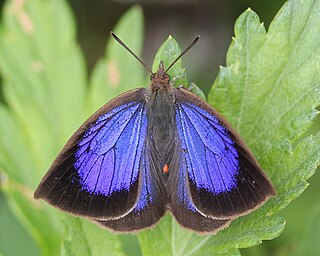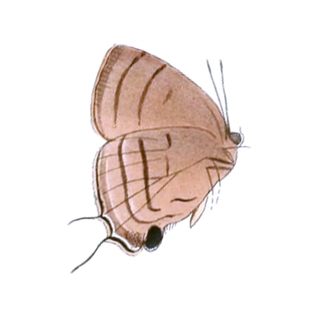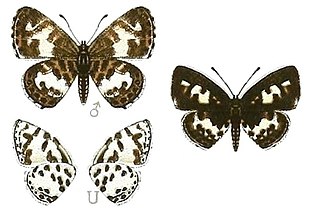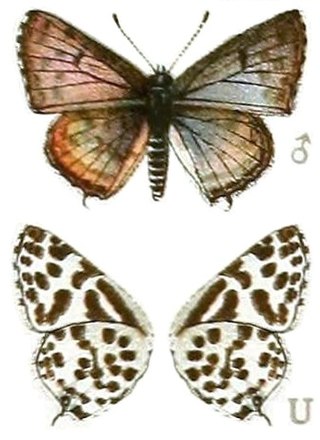
The Coleophoridae are a family of small moths, belonging to the huge superfamily Gelechioidea. Collectively known as case-bearers, casebearing moths or case moths, this family is represented on all continents, but the majority are found in temperate areas of the Northern Hemisphere. They are most common in the Palearctic, and rare in sub-Saharan Africa, South America, and Australia; consequently, they probably originated in northern Eurasia. They are relatively common in houses, they seek out moist areas to rest and procreate.

Castalius rosimon, the common Pierrot, is a small butterfly found in India that belongs to the lycaenids, or blues family.

Tarucus nara, the striped Pierrot, is a small butterfly found in Sri Lanka and south India that belongs to the lycaenids or blues family.

Tarucus ananda, the dark Pierrot, is a small butterfly found in India that belongs to the lycaenids or blues family. It was formerly placed in the genus Castalius, and with the delimitation of Castalius versus Tarucus being not fully resolved this may well be correct.

Tarucus is a butterfly genus in the family Lycaenidae. They are commonly known as blue Pierrots or simply Pierrots. The latter name is often used for the closely related genus Castalius. The delimitation of Castalius versus Tarucus is not yet fully resolved, with some species, such as the dark Pierrot, having been moved between the two genera repeatedly. It may even be that they are eventually regarded as synonymous, and in that case the older name Castalius would supersede Tarucus by the Principle of Priority.

Melitaea is a genus of brush-footed butterflies. They are here placed in the tribe Melitaeini of subfamily Nymphalinae; some authors elevate this tribe to subfamily rank.

Polyommatini is a tribe of lycaenid butterflies in the subfamily of Polyommatinae. These were extensively studied by Russian novelist and lepidopterist Vladimir Nabokov.

The Eumaeini are a tribe of gossamer-winged butterflies. They are typically placed in the subfamily Theclinae, but sometimes considered a separate subfamily Eumaeinae. Over 1,000 species are found in the Neotropical realm

The Cheritrini are a small tribe of butterflies in the family Lycaenidae; they contain the imperials and allies. Their closest living relatives seem to be the Horagini; indeed, the genus Ahmetia was in the past often placed there.

Arhopala is a very large genus of gossamer-winged butterflies (Lycaenidae). They are the type genus of the tribe Arhopalini. In the relatively wide circumscription used here, it contains over 200 species collectively known as oakblues. They occur from Japan throughout temperate to tropical Asia south and east of the Himalayas to Australia and the Solomon Islands of Melanesia. Like many of their relatives, their caterpillars are attended and protected by ants (myrmecophily). Sexual dichromatism is often prominent in adult oakblues.

The Eurybiini are a small tribe of metalmark butterflies. They are one of the basal tribes of the Riodininae, outside the main radiation but not quite as primitive as the Mesosemiini. Though numerous Riodinidae genera have not yet been unequivocally placed in a tribe and the genus list is thus preliminary, it is not very likely that many other genera will end up being assigned here.

Lamasina is a genus of gossamer-winged butterflies ; the validity of its name is subject to dispute. Among its family, these sexually dimorphic Lepidoptera belong to the tribe Eumaeini of the subfamily Theclinae. Lamasina species are found mainly in northern South America, approximately to the Guyanas. L. draudti is also found in Central America south of the Yucatán Peninsula. In the Andes, the genus extends somewhat further south; L. rhaptissima almost reaches Bolivia.

Leptotes is a butterfly genus in the family Lycaenidae. They are commonly known as zebra blues in reference to their zebra-striped undersides.

Phengaris is a genus of gossamer-winged butterflies in the subfamily Polyommatinae. Commonly, these butterflies are called large blues, which if referring to a particular species is P. arion, a species resident in Europe and some parts of Asia.

Theritas is a genus of gossamer-winged butterflies found in the Neotropics. Among the tribe Eumaeini of its subfamily Theclinae, it is usually placed in the group around the genus Atlides. In particular, it seems most closely related to Arcas.

Tuxentius is a butterfly genus in the family Lycaenidae. They are commonly known as pied Pierrots or pies. Contained in this genus are the African species formerly placed in Castalius, except the blue-eyed Pierrot which is separated in Zintha.

Zintha is a butterfly genus in the family Lycaenidae. It is monotypic, with the only species being Zintha hintza, the blue-eyed Pierrot, blue pied Pierrot or Hintza blue. The pied Pierrots proper are the closely related genus Tuxentius, however, and like Zintha they were formerly included in Castalius.

Acerbas is an Indomalayan genus of skipper butterflies.

Scythris is a genus of gelechioid moths. It is the type genus of the flower moth family, which is sometimes included as a subfamily in the Xyloryctidae, or together with these merged into the Oecophoridae. The genus was erected by Jacob Hübner in 1825.

Tarucus waterstradti is a small butterfly found in the Indomalayan realm that belongs to the lycaenids or blues family. It was first described by Hamilton Herbert Druce in 1895.The name honours John Waterstradt.




















